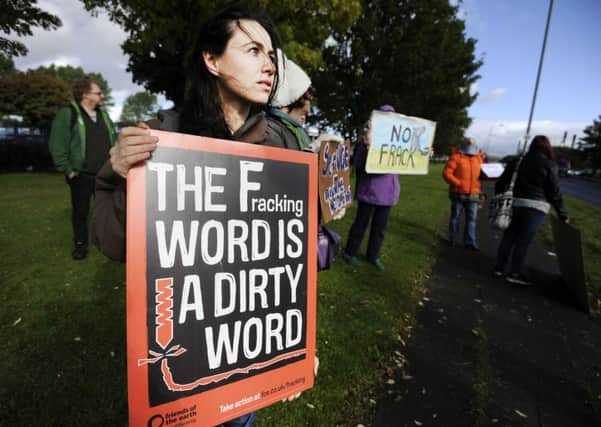SNP MSPs urged to support Labour's fracking ban bill


Environment and climate change spokeswoman Claudia Beamish appealed to nationalist MSPs and those of other parties as she unveiled proposals for a member’s Bill on the issue at Holyrood.
A public consultation on the Bill will seek views on issues including the safety and environmental risks of fracking, investment in renewables and Scotland’s transition to a low carbon economy.
Advertisement
Hide AdAdvertisement
Hide AdIn June, the Scottish Parliament voted to support an outright ban on fracking after Labour, the Lib Dems and the Greens united to back it and SNP MSPs abstained.
Launching her proposals on the day the global Paris Climate Change Agreement takes effect, Ms Beamish said Scotland had an opportunity to “send a message to the world” by banning fracking.
She said: “This is about the kind of Scotland we want to leave our grandchildren.
“The science is clear, we don’t need another fossil fuel and we need to transition to clean energy.
“The other parties in Holyrood should back my bill. SNP MSPs face a choice: they can work with Labour and ban fracking or they can work with the Tories to allow drilling under family homes in central Scotland.”
A Scottish Government moratorium on unconventional oil and gas extraction, including fracking, remains in place while ministers consider the evidence.
A spokesman said: “No fracking can take place in Scotland as a result of the moratorium on unconventional oil and gas extraction which the Scottish Government has already put in place.
“We continue to take a cautious and evidence-led approach to unconventional oil and gas (UOG) and have commissioned a series of independent research projects to examine potential environmental, health and economic impacts to inform this approach which will be published on Tuesday November 8.
Advertisement
Hide AdAdvertisement
Hide Ad“We will thereafter engage the people of Scotland in a consultation before taking a decision on the future of UOG technology in Scotland.”
Ms Beamish’s Bill was welcomed by environmental groups, with Friends of the Earth Scotland head of campaigns Mary Church describing it as “a very important step in the fight against fracking”.
She said: “We urge MSPs and parties to get behind this Bill and work together to protect the environment and end uncertainty for communities.”
Lang Banks, director of WWF Scotland, said: “It’s great to see Scottish Labour acting on its commitment to an outright ban on fracking by bringing forward this bill.
“There is overwhelming public opinion in favour of cleaner forms of energy and a sufficient body of evidence on why unconventional oil and gas are neither good for people or the planet.”
The Scottish Greens, while acknowledging the Bill would add “welcome pressure” on the Government, said the forthcoming Climate Bill would offer a better chance to rule out fracking.
Jim Ratcliffe, chief executive of chemicals giant Ineos which has fracking exploration licences for Scotland, has said shale gas extraction could transform communities blighted by a collapse in manufacturing.
GMB Scotland secretary Gary Smith accused Labour of “abandoning pragmatic politics in favour of the politics of protest”.
Advertisement
Hide AdAdvertisement
Hide AdHe said: “Shale gas gives Scotland an opportunity to secure an affordable and indigenous gas supply which could help tackle fuel poverty, reduce bills and create significant employment opportunities.”
